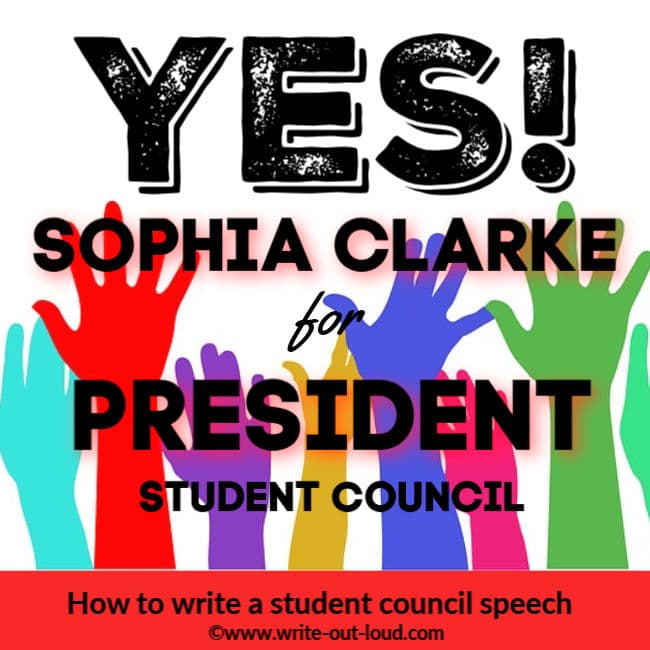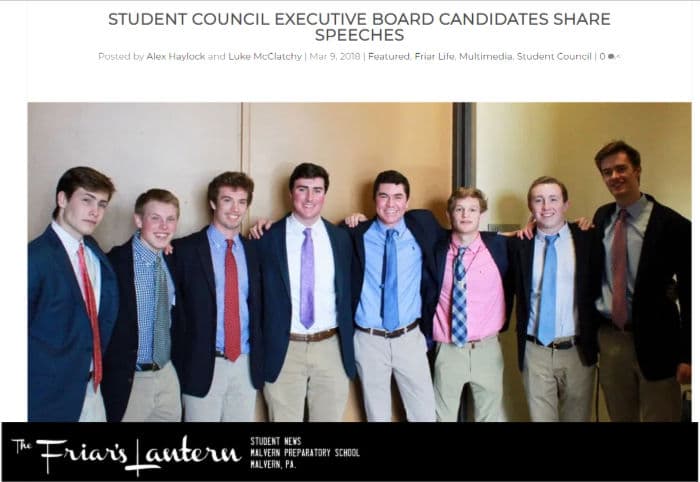Unique Funny Approaches to Student Council Speeches
Student Council Speeches -
By: Susan Dugdale | Last modified: 04-11-2021
A template, guidelines, & an example speech
Student Council Speeches mark the end of an election campaign.
Will yours be successful?
The final answer is in the hands of your peers. It's their decision but up until they mark their voting papers 'yes' or 'no' you have the potential to make their choice of candidate 'you'.
Writing a student council speech step by step
You'll find everything here you need to craft a winning student council speech.

- a template that includes all the necessary elements of a persuasive speech
- points to consider carefully before you write
- an example student council president speech
- tips for writing - the type of language to use, how to structure it and more
- vital tips for rehearsal. These make the difference between looking and sounding polished and bumbling.
- a link to a collection of recent student council speeches
- how to manage anxiety about speaking in front of others
Understanding your speech purpose
Understanding the nature or purpose of your speech could make all the difference between winning and losing.
Student Council speeches are persuasive speeches. Their ultimate goal is to get the 'yes' vote. To help you achieve that use the template below to cover all the essential elements.
Student Council Speeches Template
Introduction

- Greeting - Attention Getter - the hook
You'll need an opening statement or rhetoricalquestion to sit your audience up with open ears and mind. - Who you are - your name, your place or grade in the school
- What you want - the role you are campaigning for: President, Vice President,Treasurer, Historian...
- What you are going to do for the audience - benefits to them in exchange for their vote .
(Brief summary -you will expand this in the body of your speech.) - Credibility - your qualification or expertise establishing your fitness for the role you want.
(Brief summary - you will expand this in the body of your speech.) - Transition leading to ...
Body
- Your Main Idea 1 - Your goal for the role, what you want to achieve, how you plan to do it, the benefits to the audience, your fitness for the job, transition to...
- Main Idea 2 - Supporting ideas - details and examples - transition to...
- Main Idea 3 - Supporting ideas - details and examples - transition to...
NB. Only include a second and third idea if you have time to expand on them. If not, move through to the conclusion.
Conclusion
- Summary of main idea(s)
- Re-statement of what you want - to be elected to the role you're running for
- Re-statement of the benefits to the audience
- Closer, clincher, call for action
Points to consider BEFORE you write:
-
Research the role
Know the scope of the position you're campaigning for.
What tasks are you expected to fulfill?
What qualities are you expected to show? -
Your audience
Who are you speaking to?
What are their concerns?
What do they want from you?
What tone or choice of vocabulary is best suited to them?Avoid trying to impress with either 'big' words or use of slang. Both are traps! Be yourself.
What 'hook' will you use to get them to listen? Humor?
Humor is good if it is relevant and inclusive rather than exclusive (no 'in' jokes!). -
Your goal in the role you want
What exactly do you want to achieve?
Is it possible?
Do you have a plan?Avoid setting up expectations that you will deliver beyond your capability. Keep it real!
-
Your credibility or qualifications
What makes you fit for the role? Your previous experience? Your personal characteristics?Now is not the time either to be shy or arrogantly big-headed! Let the audience know how fitting you are for the role you want.
-
Your school's requirements
Many schools require speeches to be submitted to staff before they are delivered.If your speech does not meet pre- established criteria in any way you may find it is returned to you edited. It's safer to find out what those criteria are BEFORE writing to avoid having to re-write or worse, being disqualified entirely.
-
Fairness
You are competing against your peers but do so in way that reflects how you would want to be treated.Mockery and personal insults are not clever. They boomerang back on you, letting your audience know you're not to be trusted and neither are you ready for leadership.
Readily acknowledging the skill and expertise of your fellow candidates sincerely in a way that doesn't demean yourself shows an open mind and maturity.
Student Council speech example: President
Here's a sample speech. I've written it from the perspective of someone running for President. As you read it, imagine it said aloud. That will help you get the rhythm and flow of language. The speech is between 3 - 4 minutes long depending on how quickly you speak.
Vote Sophia Clarke for Student Council President

"I've got a question for you. I'm not asking you to shout your answer out, or raise your hand. All I'm asking is that you give it room in your mind. Let it sit for a bit, and have a think about it.
My question is – do you believe like I do, that all of us deserve the opportunity to make the best of ourselves? Not second best, 3rd, or even, highly commended. The BEST.
I'm Sophia Clarke. I'm in the 12 th grade, and I'm running for president. My vision is that each student is enabled to develop the skills and confidence to become the bigger, better version of themselves. The best they can be. Regardless of who they are, and what they need to achieve that.
It's an audacious goal. Some would say an idealistic, rather than a realistic, one.
However I say it's awesome. And that you're intelligent people who realize that reaching any goal starts with taking the first step.
So let me remind you why choosing me, Sophia Clarke, for president, is also choosing a better chance for yourself, and everyone else to grow.
I know you, and I know your needs well. I've served on your behalf in multiple roles through my years here; secretary, auditor, public relations officer, and have successfully taken on multiple issues. You'll know some of those through directly benefiting from them.
It was me who was behind the push to get a regular anti-bullying program running throughout the school. That was two years ago, and now the Teens Against Bullying message underpins what we expect and strive for in our every day dealings with each other. We know incidents of bullying are far fewer as a result. As our orange tee shirts say we 'choose kindness, acceptance and inclusion' for each other, and our selves.
Who has been involved in our mentoring-homework program? Either as a buddy-tutor or as a student getting a helping hand? And who, like me, is passionate about making sure that everybody gets a fair go? Under my watch that program has escalated. We have over 50% more tutors across more subject areas and more students taking up the offer of help. That is a fabulous outcome for everybody. Truly win-win.
A tick in the box alongside my name is a tick for the continued growth of those programs. Their value is proven. They allow each of us to grow and experience the strength and confidence that comes from knowing that we can make a positive difference in other people's lives as well as our own.
When you vote me for President you get my capacity to organize, to liaise, to listen and to speak, working for the benefit of everybody.
A yes for me is a yes for appreciating and celebrating diversity.
A yes for me, Sophia Clarke for President, is yes to a better you.
And together that is a yes to a better life, and a better school, for all of us."
Tips for writing your speech

- Brainstorm your ideas first.
Start with noting ideas for the body of your speech as this is the most important part before going on to the introduction and the conclusion. - Include your campaign slogan in your opening and conclusion.
- Keep your style conversational rather than overly formal.
- Use smaller rather than large sentences.
- Use active rather than passive words. These convey enthusiasm.
Check this page on using action verbs . You'll discover how to go fromboring bla bla bland to dynamic excitement. - Lead with your strongest idea first.
Give specific examples to illustrate it where possible. - Eliminate 'weasel' words or padding that add nothing to your presentation.
- Aim to have your speech ready BEFORE the deadline.
Give yourself time to prepare thoroughly, including a review of your opponents' campaigns.
Timing and word count
Student Council Speeches are generally brief: around 1-4 minutes long. That's between approximately 150 - 500 words at an average speaking rate of 150 words per minute.
To be safe say your speech out loud and time it. Sometimes going overtime can result in being disqualified.
Going faster to fit everything in
Please do not be tempted to say it faster to get everything you planned said. As a strategy it doesn't work. You'll end up gabbling: speaking far too quickly and people won't be able to understand what you're saying.
Cutting out extra material
If you have got too much material for the time limit, cut it. Choose the least important ideas to let go of first. Then move on to rephrasing to reduce the number of words used to express a point.
When you think it's done, test by saying the speech aloud as if you were delivering it for real, and timing it.
AFTER you've finished writing your speech

Please rehearse your speech! Do not be tempted to wing it.
The more you rehearse the easier it will be deliver it well.
Remember it is only 1 to 4 minutes long!
In that time your goal is to have your audience ready to vote for you.
You can help them make that decision by being confident which you will show through:
- your speaking style - natural, sincere, fluent, understandable (clear and able to be heard without straining)
- your body language - relaxed, open gestures, good eye contact and smiling
- your personal grooming or presentation - how you look 'speaks' too.
Make sure that your clothing and general grooming supports your speech for, like it or not, you will be judged on both!
Videoed Student Council speech examples
How do other people handle their speech?
Are they funny? Formal? Too hurried? Confident? Familiar?
It can help to look at what others have done. Even if it's only to decide their way will not be your way!

Click the link to access a collection ten videoed student council campaign speeches from the 2018 student council executive board candidates for Malvern Preparatory School, Malvern, Pennsylvania, USA.
At the foot of the article you'll find links to the videos of the school's 2015, 2016 and 2017 student council campaign speeches.
A word of warning
Elections can be very unpredictable. (That's an understatement!) You may have written and delivered a superb speech. You may even be the best candidate, but nevertheless you need to understand that you might lose. Be prepared to lose graciously and to sincerely congratulate the winner.

- Return to top of student council speeches page
cannadythersenight.blogspot.com
Source: https://www.write-out-loud.com/student-council-speeches.html
0 Response to "Unique Funny Approaches to Student Council Speeches"
Post a Comment